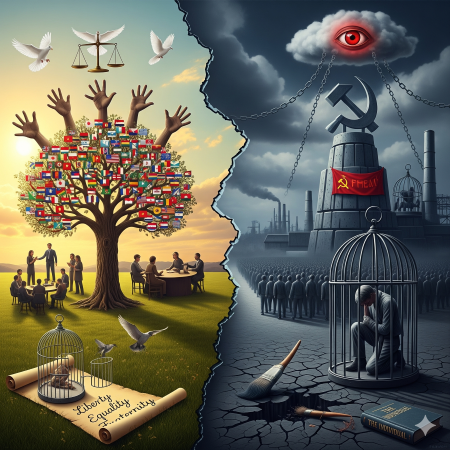COMMUNISM- How does communism seek to create equality by reducing wealth gaps and class divides?

Communism seeks to create equality by eliminating private ownership of the means of production—such as factories, land, and resources—which it sees as the root cause of class division and wealth inequality.
In its ideal form, communism envisions a classless, stateless society where all property is owned communally and goods are distributed based on individual need.
The Theory of Class Struggle
At the core of Marxist theory, which underpins modern communism, is the idea of class struggle. Marx believed that throughout history, society has been divided into a small ruling class that controls the means of production and a larger working class that provides the labor. Under capitalism, these two classes are the bourgeoisie (the owners) and the proletariat (the workers).
Marx argued that the bourgeoisie exploit the proletariat by paying them meager wages while keeping the profits generated by their labor. This fundamental inequality, he contended, is a systemic flaw of capitalism that can only be resolved through a revolution.
How Communism Aims to Abolish Classes
Communism's strategy for achieving equality involves a two-phase process:
-
Abolition of Private Property: The initial and most crucial step is to abolish private ownership of the means of production. This is distinct from personal property (like a house or car). The goal is to remove the ability of a small group of people to control the economy and extract wealth from the labor of others. By transferring ownership to the community or the state, communism aims to ensure that the benefits of production are shared by everyone.
-
Distribution based on Need: After the revolution, a transitional state would oversee the redistribution of wealth. In the final stage of communism, as outlined by Marx, society would operate under the principle, "From each according to his ability, to each according to his needs." This means that people would contribute to society based on what they're capable of, and in return, they would receive what they need to live. The idea is to eliminate the need for money, competition, and wages, thereby removing the economic basis for class distinction.
Outcomes in Practice
While the theory aims to create a more equitable society, historical implementations of communism, such as in the Soviet Union and China, have produced different results. These regimes, often characterized by one-party rule and centralized economic planning, replaced the capitalist hierarchy with a new one led by party bureaucrats. Although income inequality was often reduced, new forms of privilege and hidden inequalities emerged based on political connections and control over the distribution of goods and services.
- Questions and Answers
- Opinion
- Motivational and Inspiring Story
- Technology
- Live and Let live
- Focus
- Geopolitics
- Military-Arms/Equipment
- Sicherheit
- Economy
- Beasts of Nations
- Machine Tools-The “Mother Industry”
- Art
- Causes
- Crafts
- Dance
- Drinks
- Film/Movie
- Fitness
- Food
- Spiele
- Gardening
- Health
- Startseite
- Literature
- Music
- Networking
- Andere
- Party
- Religion
- Shopping
- Sports
- Theater
- Health and Wellness
- News
- Culture

